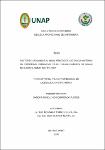| dc.contributor.advisor | Torres Silva, Rossana | |
| dc.contributor.advisor | Flores Nunta, Saul | |
| dc.contributor.author | Chuquipiondo Flores, Sandra Jonelly | |
| dc.date.accessioned | 2023-06-13T17:58:05Z | |
| dc.date.available | 2023-06-13T17:58:05Z | |
| dc.date.issued | 2023 | |
| dc.identifier.uri | https://hdl.handle.net/20.500.12737/9132 | |
| dc.description.abstract | The objective of the study was to determine the association between sociocultural and institutional factors and the early initiation of breastfeeding in immediate puerperal women in the health facility I – 4 Bellavista Nanay, Iquitos 2022. The approach was quantitative, non-experimental, correlational and cross-sectional, the population was made up of 75 immediate puerpera. The survey was used as a technique, the instruments were: a questionnaire of sociocultural and institutional factors (validity 91.25%) and reliability of the cultural factor (knowledge 82.3% and beliefs 82.6%); and registration form on early initiation of breastfeeding (validity 92.50%). The results obtained were: social factors: 73.3% were aged between 18 and 35 years, 73.3% lived together, 64.0% had a secondary education, 76.0% were housewives and 57.3% came from human settlements; cultural factors: 54.6% presented regular knowledge and 64.0% unfavorable beliefs about LM; institutional factors: information received about L.M. At the time of birth 49.4% and elapsed time of delivery of the baby after delivery, < to 45 minutes 89.4%. Regarding the early onset of LM. 76.0% started and 24.0% did not. In conclusion, there is a statistically significant relationship between the degree of education (p = 0.003), knowledge about LM (p = 0.022) and beliefs about LM (p = 0.008) with the early onset of LM. There was no statistical significance (p > 0.05) between age, marital status, occupation, origin, information received about L.M. and delivery time of the baby with early onset of LM. | en_US |
| dc.description.abstract | El objetivo del estudio fue determinar la asociación entre factores socioculturales e institucionales y el inicio precoz de la lactancia materna en puérperas inmediatas en el establecimiento de salud I – 4 Bellavista Nanay, Iquitos 2022. El enfoque fue cuantitativo, diseño no experimental, correlacional y transversal, la población estuvo conformada por 75 puérperas inmediatas. Se empleó como técnica la encuesta, los instrumentos fueron: un cuestionario de factores socioculturales e institucionales (validez 91,25%) y confiabilidad del factor cultural (conocimiento 82,3% y creencias 82,6%); y ficha de registro sobre inicio precoz de la lactancia materna (validez 92,50%). Los resultados obtenidos fueron: factores sociales: 73,3% tuvieron edades entre 18 a 35 años, 73,3% convivientes, 64,0% con grado de instrucción secundaria, 76,0% amas de casa y 57,3% procedieron de asentamientos humanos; factores culturales: 54,6% presentaron conocimiento regular y 64,0% creencias desfavorables, sobre L.M.; factores institucionales: información recibida sobre L.M. al momento del nacimiento 49,4% y tiempo transcurrido de entrega del bebe después del parto, < a 45 minutos 89,4%. Respecto al inicio precoz de L.M. 76,0% iniciaron y 24,0% no. Concluyendo, que existe relación estadística significativa entre el grado de instrucción (p = 0,003), conocimiento sobre L.M. (p = 0,022) y creencias sobre L.M. (p = 0,008) con el inicio precoz de la L.M. No hubo significancia estadística (p > 0.05) entre la edad, estado civil, ocupación, procedencia, información recibida sobre L.M. y tiempo de entrega del bebe con inicio precoz de L.M. | es_PE |
| dc.format | application/pdf | es_PE |
| dc.language.iso | spa | es_PE |
| dc.publisher | Universidad Nacional de la Amazonía Peruana | es_PE |
| dc.rights | info:eu-repo/semantics/openAccess | * |
| dc.rights.uri | https://creativecommons.org/licenses/by/4.0/ | * |
| dc.subject | Lactancia materna | es_PE |
| dc.subject | Periodo postparto | es_PE |
| dc.subject | Factores culturales | es_PE |
| dc.subject | Madres | es_PE |
| dc.subject | Postas médicas | es_PE |
| dc.title | Factores asociados al inicio precoz de lactancia materna en puérperas inmediatas en el establecimiento de salud Bellavista Nanay Iquitos 2022 | es_PE |
| dc.type | info:eu-repo/semantics/bachelorThesis | es_PE |
| thesis.degree.discipline | Enfermería | es_PE |
| thesis.degree.grantor | Universidad Nacional de la Amazonía Peruana. Facultad de Enfermería | es_PE |
| thesis.degree.name | Licenciado(a) en Enfermería | es_PE |
| dc.subject.ocde | https://purl.org/pe-repo/ocde/ford#3.03.03 | es_PE |
| renati.author.dni | 71824294 | |
| renati.advisor.orcid | https://orcid.org/0000-0002-9364-0837 | |
| renati.advisor.orcid | https://orcid.org/0000-0002-4267-0462 | |
| renati.advisor.dni | 05257166 | |
| renati.advisor.dni | 09671010 | |
| renati.type | https://purl.org/pe-repo/renati/type#tesis | es_PE |
| renati.discipline | 913016 | es_PE |
| renati.level | https://purl.org/pe-repo/renati/level#tituloProfesional | es_PE |
| renati.juror | Alvarado Cora, Haydee | |
| renati.juror | Tejada de Navarro, Juanita de Fátima | |
| renati.juror | Bardales Arévalo, Rosario del Pilar | |
| dc.publisher.country | PE | es_PE |





